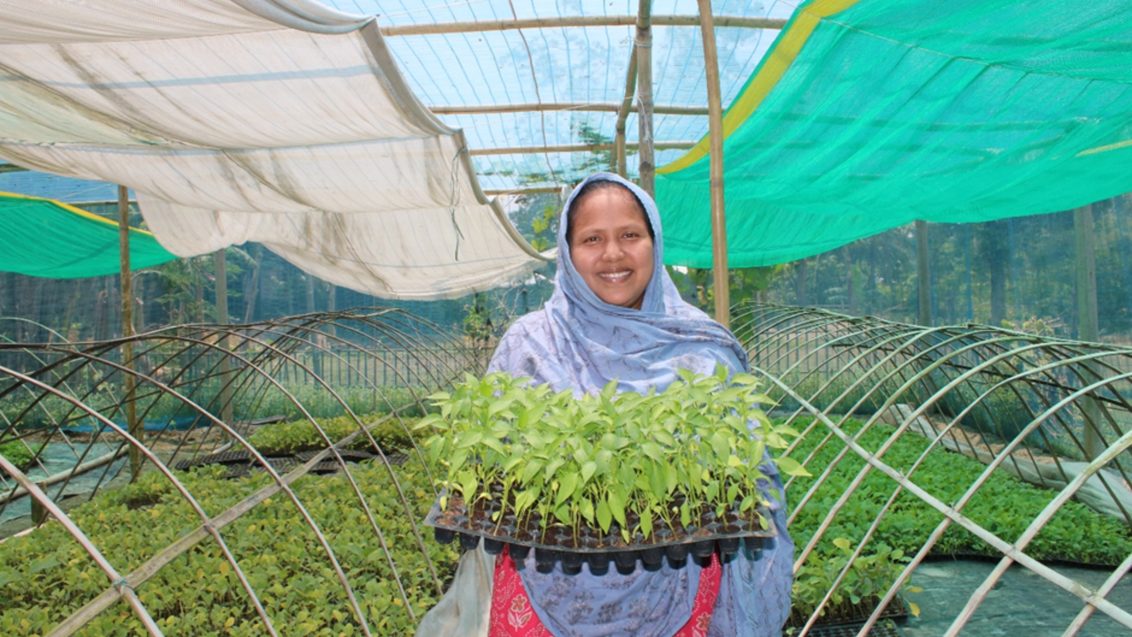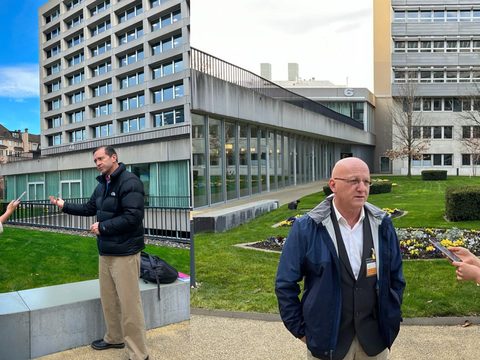A woman’s new business sows the seeds of family well-being

The NICE project and Luna Akhter's journey to entrepreneurial success
I am really happy and grateful to the NICE project for creating employment opportunities for a woman like me. Receiving technical knowledge for safe food production and the Farmers’ Hub business model has made me empowered to create an impact on my family and community. I not only produce safe, fresh nutritious vegetables but also consume them with my family.
Rangpur is a peri-urban area of Bangladesh, where 30% of women were found to rely on only poorly diverse diets according to the NICE baseline, and employment opportunities for women are often limited. The agripreneurship and nutrition focus of the NICE project provides a new route to female and youth empowerment. It also helps smallholders produce more safe and nutritious vegetables, resulting in healthy dietary diversity for city dwellers.
Luna Akhter used to be a housewife, responsible for a family of nine and was struggling to find employment after her Master’s degree at Carmichael College, Rangpur. However, she could not secure herself a job. Balancing the parallel challenges of studies, job-seeking, family responsibilities, and her first pregnancy in 2017, Luna was determined to ensure a decent household income. COVID-19 pandemic made life more miserable than ever before; her husband lost his job in Dhaka and moved back to the village, Pirgacha, Rangpur. Deeply concerned about their future, Luna took matters into her own hands.
In May 2022, Luna’s brother told her about the innovative concept of the NICE project’s Nutrition Farmers' Hubs (FHs). Eager to explore the opportunity, she attended a roadshow that provided comprehensive insights into FHs’ working potential. At the event, Luna was selected as an agripreneur candidate. Training followed, for example on developing herself successfully in business, following the well-established FH model. To supply safe and nutritious vegetables to lucrative city markets, smallholders need good inputs and advice. However, they often have difficulties finding good quality seedlings. FHs close this supply gap. Syngenta Foundation for Sustainable Agriculture Bangladesh provided Luna with the technical support to start serving the smallholders in her community.
In August 2022, Luna started her Farmers’ Hub on about 0.03 hectare beside the road. She set it up in the Pirgacha sub-district of Rangpur, one of the NICE project cities. She and her husband called the business Mohishmuri Farmers’ Hub. To get going, they invested BDT 150,000, currently about $ 1,400. Two-thirds came as an interest-free loan from their relatives, to be repaid gradually as the business flourished.
Luna started by producing safe vegetable seedlings in 500 trays, each with 104 holes. Responding to increasing demand, she bought 500 more seedling trays, but those were still not enough. Within three months, Luna added another 400 seedling trays. The first 500 trays contained cauliflower and cabbage seedlings. Luna sold all 52,000 seedlings for BDT 93,600 ($860). This great start enabled her to begin repaying the loan. She soon started producing seedlings of tomato, chilli, papaya, bitter gourd, snake gourd, ash gourd, and brinjal (eggplant). To ensure good demand, Luna concentrates on whichever vegetables are in season.
By mid-2023, Luna had sold seedlings for more than BDT 227,000 (approximately $2,085). Demand continues to rise. Luna has even had to source seedlings from other FHs to meet smallholders’ orders. From being unemployed a year ago, she now earns between BDT 40,000 - 50,000 (approximately $370 - 470) per month. Besides selling seedlings, Luna advises community farmers on modern crop cultivation practices, and aggregates safe and fresh farm produce supplying to the city markets.
Luna expresses deep gratitude to NICE project for paving the way for this incredible opportunity. Through this initiative, unemployed women like her make their dreams come true. She also contributes significantly to addressing gender disparities in the job market. Luna is firm in her determination to achieve success through her relentless efforts, and she takes particular satisfaction in generating employment opportunities for others. Currently, she has employed two female laborers and one male labourer to assist in her agricultural production endeavours. Luna also provides services and encouragement to other neighbouring smallholders.
The NICE project has provided Luna with valuable training on agroecology and safe food production. Moreover, she also received training on agribusiness management and getting connected to input and output market linkage. She says the training on crop production has significantly contributed to her entrepreneurial success. Smallholders who buy from Luna know they are getting significant benefits from high-quality seedlings, so they keep asking for more. The growing area at Luna’s FH has already more than doubled, she plans to increase it to about 0.12 hectare.
NICE aims to empower small businesses, women, and youth entrepreneurs. Together, they are amalgamating for creating nutrition vital cities. Like Luna’s Nutrition Farmers’ Hub there are 27 successfully running Nutrition Farmers’ Hubs working together for the betterment of their own and serving safe and nutritious vegetables for Rangpur city dwellers.

